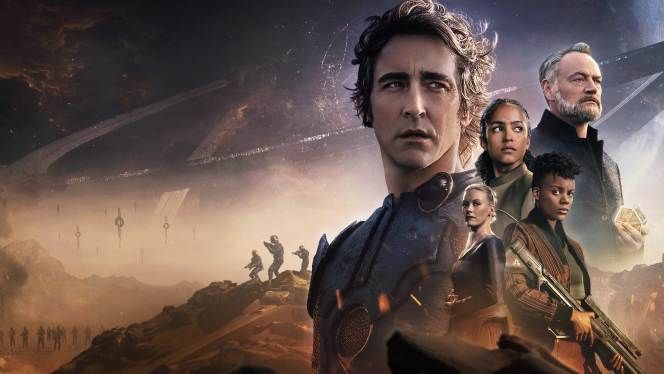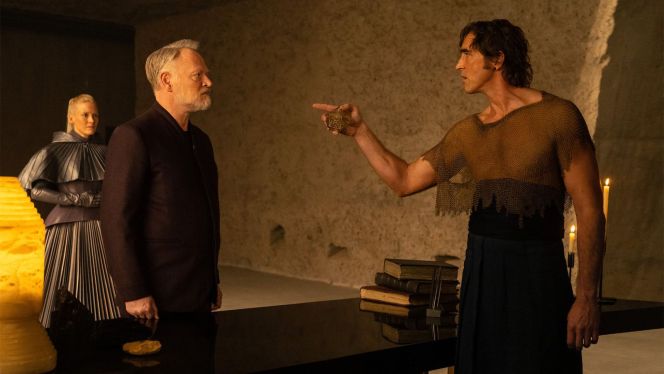TV SERIES REVIEW – A decade ago, no one would have dared attempt a television adaptation of Isaac Asimov’s epic Foundation. But by the end of the second season, Apple TV Plus’s gamble seems to be paying off. The new episodes promise much for the future, but will the Foundation series raise the bar, or is it just another chapter in an overdesigned universe?
Just a short decade ago, no one would have bet that Isaac Asimov’s “Foundation” would make it to the screen. No traditional broadcaster had the patience, and the BBC could never have justified the budget. Even cable giant HBO would have shied away from such a high-budget sci-fi drama, which would require at least a season and a half to establish its direction.
In the era of streaming services, where players with huge budgets like “The Lord of the Rings: The Rings of Power” or “The Crown” get the green light, Apple TV Plus is taking a monumental risk with the Foundation project. By the end of the second season, however, the venture seems to be bearing fruit. Still, it’s not yet clear whether Foundation will be a great sci-fi TV series based on the books, or whether it will ultimately fail.
Foundation’s first season: three Cleons on the throne, opposed by a rebellious mathematician
The Foundation, which premiered in 2021, is set in a futuristic universe where a galactic empire rules the known world. And no, it’s not the Empire we might first think of. This entity is led by a genetically cloned Emperor dynasty, the successors to the original Cleon. The government uniquely spans three generations: young Brother Dawn, who is still learning; middle-aged Brother Day, who is entrusted with wielding the power; and aging Brother Dusk, who offers the wisdom of life and, well, paintings.
Not everyone is happy with the ruling trio. Mathematician Hari Seldon develops a complex algorithm that predicts the future and offers an alternative life path through the Foundation. It’s as if he’s a Luke Skywalker armed with a math book, toppling the Empire over the course of a few centuries.
The first season of Foundation was a test of endurance. It was a show to be admired rather than enjoyed. As it told the story of a futuristic, space-faring society spanning centuries, it often felt like complex world-building for its own sake. If ever a show needed a glossary or Spider-Man: Into the Spider-Verse-style footnotes, it was Foundation.
Sex with androids, paranoia and breaking tradition
Dazzling visuals and ambitious ideas dominate, as if these were the key elements in a universe where the number of identifiable, sympathetic characters is quite limited. The show often relies on visual effects that make you want to buy a new, better TV.
This trend doesn’t change when the second season of Foundation picks up 138 years later. A new Cleon takes the stage, with the same genetic code as his predecessors – and of course Lee Pace still portrays the character. This Cleon has new plans; he wants to produce an heir in the traditional way, and even selects a queen for this purpose. Of course, the ruler also has sexual encounters with his robotic assistant, but when their romantic moments are interrupted by assassination attempts, Cleon’s already significant paranoia only grows.
Meanwhile, outside the borders of the Galactic Empire on the planet Trantor, the Foundation’s situation is becoming increasingly uncertain. The young but exceptional mathematician Gael Dornick and his psychohistorian colleague Hari Seldon face a new threat that even their mathematical models could not predict. The collapse of the Empire is now inevitable, and the world they have built is in peril.
More emotion, more interesting, more colorful characters, better acting
The second season of Foundation opens up a new dimension: finally, not only grandiose galactic events take center stage, but also human emotions. The exciting dynamic between newly introduced and returning characters adds new color to the plot, while the complex narrative retains its dignity. Now it’s not just the breathtaking space stations and futuristic technology that captivate us, but also the emotional world of the characters.
On the acting front, the improvement is obvious. Lee Pace, who continues to portray Cleon at a high level, and Laura Birn, who portrays Demerzel, maintain the excellence seen in previous seasons. The new characters, such as a potential queen and a mysterious wanderer, enrich and deepen the already rich story.
Is the second season of Foundation worth your time and energy? The answer is a resounding yes. The show’s only weakness may be that it’s still not entirely friendly to those who haven’t read Asimov’s works or lack deep knowledge of the sci-fi universe. However, if you give it a chance and stick with it, you’ll definitely reach that ‘aha’ moment where everything clicks and the show shows what it’s really capable of.
-BadSector-
Foundation: Season 2
Direction - 7.8
Actors - 7.6
Story - 7.2
Visuals/Music/Sounds - 8.5
Ambience - 7.6
7.7
GOOD
The second season of "Foundation" enriches the series with multiple dimensions, deepening character development and injecting relatable emotion into the complex, galactic storytelling. While initially challenging for those unfamiliar with Asimov's original works or new to the science fiction genre, the series rewards dedicated viewers with a well-crafted and intricate universe. As the season progresses, the connections between the plot and the characters become clearer, compensating for the earlier complexity.


















Leave a Reply